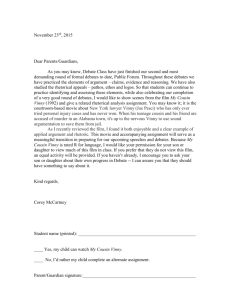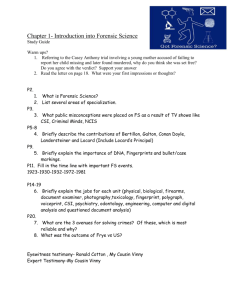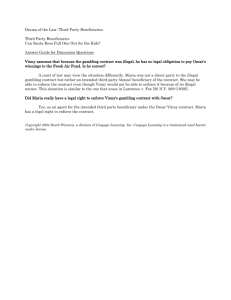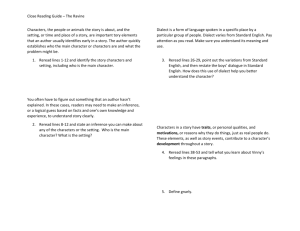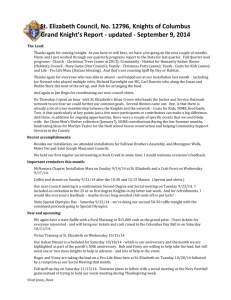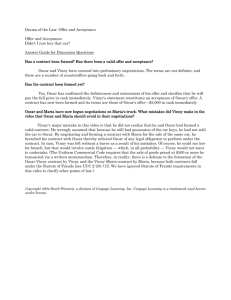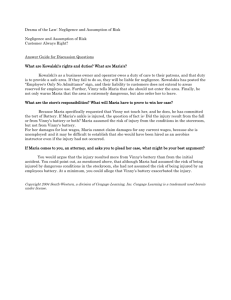My Cousin Vinny - Holy Spirit Catholic School
advertisement
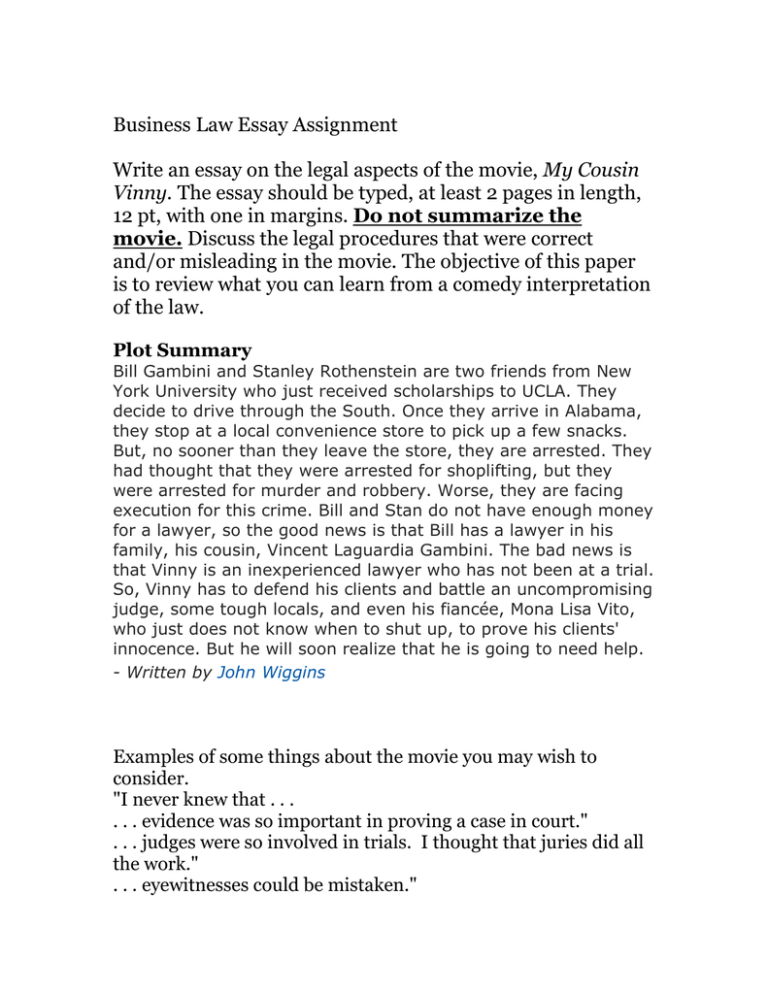
Business Law Essay Assignment Write an essay on the legal aspects of the movie, My Cousin Vinny. The essay should be typed, at least 2 pages in length, 12 pt, with one in margins. Do not summarize the movie. Discuss the legal procedures that were correct and/or misleading in the movie. The objective of this paper is to review what you can learn from a comedy interpretation of the law. Plot Summary Bill Gambini and Stanley Rothenstein are two friends from New York University who just received scholarships to UCLA. They decide to drive through the South. Once they arrive in Alabama, they stop at a local convenience store to pick up a few snacks. But, no sooner than they leave the store, they are arrested. They had thought that they were arrested for shoplifting, but they were arrested for murder and robbery. Worse, they are facing execution for this crime. Bill and Stan do not have enough money for a lawyer, so the good news is that Bill has a lawyer in his family, his cousin, Vincent Laguardia Gambini. The bad news is that Vinny is an inexperienced lawyer who has not been at a trial. So, Vinny has to defend his clients and battle an uncompromising judge, some tough locals, and even his fiancée, Mona Lisa Vito, who just does not know when to shut up, to prove his clients' innocence. But he will soon realize that he is going to need help. - Written by John Wiggins Examples of some things about the movie you may wish to consider. "I never knew that . . . . . . evidence was so important in proving a case in court." . . . judges were so involved in trials. I thought that juries did all the work." . . . eyewitnesses could be mistaken." . . . experts could testify about important information." . . . that judges got to decide if a witness could testify or not." . . . that courtroom rules were so important in trials." . . . that police can make mistakes." . . . that an innocent person could come so close to being proven guilty in court." Reference material Monday, March 12, 2012 My Cousin Vinny: a story about legal education The Abnormal Use blog is celebrating the twentieth anniversary of the release of the movie My Cousin Vinny by publishing a series of comments and interviews and also by sponsoring a multi-blog discussion on the movie. Go here to get more information. When my students ask me to recommend movies, I give them a list I have prepared over the years in which I have organized the titles under certain main “themes.” No one is surprised to see My Cousin Vinny on the list, but some are surprised I have listed it under the theme of “legal education.” So, I thought I’d use my contribution to the Abnormal Use blog’s celebration to explain why. One reason I place My Cousin Vinny under the theme of legal education is that it provides so much material you can use in the classroom. For example, you can use the movie to discuss criminal procedure, courtroom decorum, professional responsibility, unethical behavior, the role of the judge in a trial, efficient cross-examination, the role of expert witnesses and effective trial advocacy. Go here, here and here for more on this. But the reference to legal education goes deeper. I think you can use the movie to discuss the most common topic of debate within legal education itself. Interestingly, however, in My Cousin Vinny, the issue is turned on its head. After Vinny’s girlfriend Mona Lisa bails him out for a second time after having been found in contempt, she criticizes his performance in court and tells him it is pretty clear he does not know what he is doing. She then utters one of my favorite lines in the movie: “Don’t they teach you that in law school?” Vinny’s response is just as classic: “NO! They teach you Contracts...! Obviously, the implication is that in law school they teach "law" not "how to practice law". There are many ironic twists to this short exchange. First, as to those “things” that his girlfriend was referring to, we do teach you that in law school! Vinny may not have learned them - or may have forgotten them - but we do teach them! But, Vinny is right that there are many things you need to know to practice law effectively that we don’t teach in law school. The reason I say the movie turns the issue on its head is that Vinny is terrible at the things we do teach in law school, but very good at the things we don’t. Although Vinny is certainly no role model when it comes to knowledge of the law, legal analysis and ethical behavior, law students could learn from him as to how to use legal thinking in the complexity of actual law practice. Vinny needed to learn legal analysis, that which law schools are best equipped to teach, while many of today’s graduates need Vinny’s inherent ability to interview clients, to gather facts, to prepare a theory of a case, to negotiate, to know when to ask a question and when to remain quiet, to cross examine a witness forcefully (but with charm) in order to expose the weaknesses in their testimony and so on. To be successful, like Vinny, all law graduates need to develop both their analytical knowledge and their practical skills. And, also like Vinny, they need to learn to accept the fact they need help. Like Vinny, they can not do it all alone. Were it not for his girlfriend, Vinny’s attempt to practice law would have ended in a disaster and, possibly, in disbarment. We can all learn from that lesson too. Thus, in the end, what My Cousin Vinny teaches us about legal education is that law schools can and should complement the focus on legal analysis with an introduction to practice skills, but also that to expect law schools to make all students ready to practice law by themselves right after graduation after only three years of studies is a bit naive. As stressed in the final report of an ABA Task Force on legal education back in 1992, both the academic institutions and the practicing bar need to understand that they have complementary duties toward the development of skills in new graduates. Posted by Professor Alberto Bernabe at 7:59 PM MONDAY, MARCH 12, 2012 Lessons Learned from Vincent L. Gambini Aside from being a downright hilarious movie, My Cousin Vinny offers some interesting lessons for aspiring trial attorneys. Some were intentional, some not, but either way, there’s some good stuff. So, without further ado, here are six lessons learned from Vinny: Lesson 1 – Pick Your Battles Scene: Vinny doesn’t ask any questions at the preliminary hearing. His client, Stan, angrily asks, “Why didn’t you ask them any questions? Maybe if you’d put up some kind of a fight, you could have gotten the case thrown out!” Vinny calmly responds, “Hey, Stan, you’re in Ala-f*&%in’-bama. You come from New York. You killed a good ol’ boy. There is no way this is not going to trial!” Lesson: Sometimes, as an attorney, you need to know when to pick your battles. Of course, by this point in the movie, Vinny didn’t have all the great exculpatory evidence he acquired later. However, Vinny is probably right that there was no way the case would be resolved without a trial. It may have been a smart move to play it close to the vest and not reveal too much of his trial strategy. Lesson 2 – No Argument in the Opening Statement Scene: The prosecutor, Jim Trotter, delivers a textbook opening statement – a fine recitation of the prosecution’s version of the facts combined with a clever attempt to massage the jury’s collective ego. Then, Vinny stands and delivers his own rather brief opening statement: “Uh . . . everything that guy just said is bullsh*t. Thank you.” Lesson: You’ve been dying to deliver this same opening statement for years, haven’t you? It’s punchy; it cuts right to the chase. But alas, such a retort is an improper argument. Perhaps Vinny should have saved that approach for his closing argument. Lesson 3 – Match Your Negotiation Strategy to Your Opponent Scene: Vinny finds out his girlfriend got stiffed on a game of pool with some yokel. He flies down to the pool hall to collect, and the yokel asks, “How ‘bout I just kick your ass?” Vinny retorts, “Oh, a counteroffer. This is a tough decision here. Get my ass kicked or collect $200? Well, here’s my counter-offer: What if I were just to kick the ever loving sh!t out of you? . . . If I was to kick the sh!t out of you, do I get the money?” Lesson: So much for that “Getting to YES” model where everybody wins. Vinny invokes the old school tradition in his negotiations. Sometimes, that works. It’s all about knowing your opponent. Some are unreasonable. There’s no getting to “yes” without cracking skulls and forcing them to into agreement. Vinny’s method succeeded, and he eventually collected that $200. Lesson 4 – Do Some Digging Scene: There’s a long montage where Vinny performs his own investigation into the case. He has his girlfriend take some photographs along the way. Vinny is clearly annoyed when she’s trying to show him the pictures in the middle of trial. He starts ranting, “Where’d you shoot this, from up in a tree? What’s this over here? It’s dog sh!t… That’s great! Dog sh%t, what a clue! . . . I should’ve asked you along time ago for these pictures.” But then he realizes there’s a picture of the tire tracks, which really is the case cracker. Lesson: Most of the time, the facts will make or break your case. As an attorney, you can’t always wait for the facts and evidence to come to you. Even when you think you’ve got everything you need, keep digging. Get out there and visit the accident scene, personally inspect the physical evidence, and talk to everyone you think knows anything about the case. You never know what you are going to find if you keep digging. It sure paid off for Vinny in his trial, and some day, that same diligence may pay off for you in one of your cases. Lesson 5 – Be Collegial with Fellow Attorneys Scene: At one point in the movie, Vinny and the prosecutor engage in friendly discussion about their entry into the legal profession. Later in the film, the prosecutor takes Vinny on a hunting trip, lets him borrow his cabin, and even congratulates him after Vinny’s victory over him at trial. Lesson: It’s a given that you should be a zealous advocate for your client. But that doesn’t mean you can’t be civil, or even friendly, with opposing counsel. At the end of the day, you are both just doing your job. As everyone knows, one’s profession is more enjoyable when you’re working with friendly and respectful people. Two attorneys should be able to duke it out in the courtroom and then grab a drink together after the trial concludes. Lesson 6 – Stay Calm Scene: As Vinny’s defense of his clients begins to unravel, he asks himself, “How the f*&k did I get into this sh!t?” Luckily, Vinny keeps it together and eventually earns his clients their freedom. Lesson: For many attorneys, your first trial will feel just like this movie (although hopefully, it won’t be as bad in reality). You’ll have things that will go way off course, and there will probably be a point where you feel like you’re in way over your head. You may even start asking yourself “Am I cut out for this?” or “How did I get into this?” Don’t despair. Stay calm and press on. By your second or third trial, things will seem much better. These are just a few of the lessons to be learned from My Cousin Vinny. The next time you watch the movie, find a legal pad and take notes. There are many other lessons, such as proper courtroom attire, enunciation, candor toward the court, and the importance of procedural rules. It’s almost a law school course in and of itself. (To see a full index of our My Cousin Vinny twentieth anniversary coverage, please see here.). POSTED BY ROB GREEN ShareThis - See more at: http://abnormaluse.com/2012/03/lessons-learnedfrom-vincent-l-gambini.html#sthash.DfK2yrlY.dpuf Monday, March 12, 2012 An Appreciation of My Cousin Vinny - Twenty Years Later We were delighted when Jim Dedman of the Abnormal Use blog asked us to help celebrate the twentieth anniversary of My Cousin Vinny. We cannot resist smiling when we think of that movie. 1992 was a big year for some of us - marriage, changing jobs, and buying a house in LA just before the SoCal real estate market was about to take a very long, very ugly downhill run. It was our last year before big-time family responsibilities. Life seemed less serious than it does now. We filled our life with silly things, including silly movies. We had very low expectations for My Cousin Vinny before the lights went down. Most legal movies are maddeningly simplistic, even stupid. Moreover, it's not as if Joe Pesci was considered a strong movie lead - a great second banana, sure (Raging Bull), but he seemed a pure character (or caricature) actor. We had pretty much forgotten Ralph Macchio from Karate Kid. And who the heck was Marisa Tomei? Well, we were sure going to find out. While there have been stories/rumors belittling Tomei's Academy Award for Best Supporting Actress, the fact is that she is superb in every way as Vinny's long-suffering fiance, Mona Lisa Vito. ("My biological clock is ticking like this! [stomping on the porch]") Tomei's career since has had some quiet times, but she was wonderful in a Seinfeld cameo, and then came back to remind us of her talents in The Wrestler. The fact is that every performance in My Cousin Vinny is spot-on perfect. Fred Gwynne is most famous for playingHerman Munster, but he will also forever be the ultimate nay-saying Judge Chamberlain Haller in My Cousin Vinny. (“What is a yute?”) It was Gwynne’s last role before he died later that year of pancreatic cancer. At one point in the film you can espy Judge Haller’s Yale diploma. In reality, Gwynne was a Harvard man. Lane Smith plays District Attorney Jim Trotter and is splendidly aggressive, effective, and, ultimately, fairminded. Most important, Pesci was brilliant and brave and blustery and profane as Vinny LaGuardia Gambini (that name being a nice little mash-up of NYC political and criminal history). Maybe our low expectations made us like the movie even more. We have a friend who says her favorite movie this year was The Help. She saw it on cable, well after it had been pooh-poohed by many cinema and cultural critics. But she simply liked the story and the acting. By contrast, she had paid bigger bucks for movienights-out to see The Descendants and The Artist, and found them underwhelming. So maybe My Cousin Vinny gets something of a free ride by being the little movie that could. But we think there's more to it than that. If you compare My Cousin Vinny against the other movies in 1992 that earned Oscars, such as Scent of a Woman, Unforgiven, Aladdin, The Player, and Howard's End -- well, which would you rather watch this Friday night? My Cousin Vinny holds up well. There have occasionally been hints of a sequel. As we found out in a couple of posts a couple of weeks ago, sequels misfire more often than not. While we wouldn't mind spending more time with Vinny and Mona Lisa, we tremble at the prospect of some opportunistic piece of dreck ruining them. We are also fond of the Alabama setting for My Cousin Vinny. By sheer happenstance, we have had a lot of experience with cases in Alabama and working with Alabama lawyers. Again, maybe it's just happenstance, but our experiences have invariably been good and pleasurable. All the Alabama lawyers we've dealt with have been smart, hard-working, and personable. They have been polite and creative and funny. Once, a Birmingham lawyer helped us explore famous legal history by taking us to Ollie's Barbecue, which was the subject of a famous civil rights case. See Katzenbach v. McClung, 379 U.S. 294 (1964). Sure enough it was (we don't think it exists anymore) close to an interstate highway, which was part of the Supreme Court's commerce clause analysis. Plus, the pulled pork was delectable, especially doused with the vinegary sauce. (If there's one thing we love more than the law it's good BBQ. If we ever write about The Firm, expect a long reverie on great Memphis BBQ joints like Corky's and The Rendezvous. And when are our Shook friends going to take us to Arthur Bryant's, or that BBQ place at a gas station?) Further, the most famous fictional lawyer-hero in American history is from Alabama. Actually, make that hero, period, not just lawyer-hero. The American Film Institute conducted a poll and ranked Atticus Finch from To Kill a Mockingbird as the number one movie hero ever, ahead of James Bond and Indiana Jones. While Atticus Finch is fictional, he was based on Harper Lee's real-life lawyer dad. When we were a hiring partner, the Georgia.) We have taught some classes in trial advocacy and have sometimes found it useful to present film clips. Showing is better than telling. But there aren't many useful film clips from actual trials. So we turn to movies and tv. Those made-up trials aren't realistic. There is necessarily a lot of compression in movies and tv. Document reviews and seven-hour depositions are blissfully absent. Opening statements are three minutes, not three hours, long. And, lo and behold, they always seem better than real life. Here's the surprise: My Cousin Vinny offers more useful examples of effective trial advocacy than just about any other film. Start with the prosecutor's opening statement. It is really short and really effective. Lane Smith tells the story of the robbery in simple, concrete terms, and emphasizes the unique appearance of the getaway car. He varies his pace and modulation. He raises his voice only when describing the shots ringing out. He tells a story without wasting a moment. When we prosecuted cases, we were taught to refer to "the defendants," and never to dignify them with their names. But the DA in My Cousin Vinny repeatedly mentions the names of the defendants, Rothenstein and Gambini, as if reminding the jury of the defendants' otherness. If you compare the prosecutor's opening statement with that from another 1992 film, A Few Good Men, you'll probably prefer the Alabama prosecutor to the slick military prosecutor played by Kevin Bacon. Our favorite object-lessons from My Cousin Vinny involve Vinny's cross-examinations of the three prosecution eyewitnesses. The first cross-examination, of Mr. Tipton, is the only one that gets combative. Sometimes it is okay to bully a witness. Vinny shows that the witness did not have the time to observe the comingsUniversity of Alabama Law School sent us a special edition of To Kill a Mockingbird. We treasure it still. So, yeah, we like Alabama a lot. We get the feeling that Vinny ended up liking it a lot, too. (All that being said, we hear the movie was shot in and goings at the Sac-O-Suds. It all comes down to how long it takes to make grits from scratch. (Vinny: “Oh, you like grits? I like grits too. How do you like your grits? Regular, creamy, or al dente?”) Earlier in the movie, Vinny got into a conversation with a local about how to make grits. Perhaps you can chalk it up to coincidence. Only in the movies, right? Maybe not. When you are at trial, you need to immerse yourself in the facts of the case, all sorts of facts. You need to visit the scene and you need to be open to all sorts of things. You never know what will become important. Sometimes just showing a witness that you know all sorts of things makes them worry you know other truths, and makes them compliant. Vinny plays on Mr. Tipton’s pride in his grits preparation, and then undermines his testimony with well-earned ridicule (“Do the laws of physics somehow cease to operate in your kitchen?”). Our favorite cross-examination is the second one, of Mr. Crane. Vinny slices and dices an eyewitness by showing that his view was necessarily obscured. The beauty of the cross-examination is how Vinny lingers over his good points. Instead, of merely challenging the witness by saying in one ham-handed swoop that the witness could not have had a good view through a dirty window and past trees and bushes, Vinny brings out each obstruction gradually. He makes the witness count the trees and bushes. Then he repeats these good facts slowly and elegantly, laying out photographs one by one:"You could positively identify the defendants for a moment of two seconds looking through this dirty window, this crud-covered screen, these trees with all those leaves, and I don’t know how many bushes [makes Mr. Crane count them, even correcting him]?" That is a technique available to every trial lawyer: find your good points and emphasize them through repetition and slowing things down. In the third cross examination, of Mrs. Constance Riley, Vinny shows that an old lady's eyesight was inadequate fomatter of good luck. But watch how nice Vinny is to the witness. (Vinny: “What do you think now, dear?" Mrs. Riley: “I'm thinking of getting thicker glasses.”) Sometimes you do better with a light hand than with bullying. You can learn a lot from My Cousin Vinny, and it's an enjoyable education. Do not underrate it because it is a comedy. We remember how police officer friends of ours used to tell us all the time that the Barney Miller sitcom was way more realistic than any cops-and-robbers-shoot-em-up about what law enforcement people actually do on a day-to-day basis. In the August 2008 edition of the ABA Journal, My Cousin Vinny was ranked as the third greatest legal movie, after To Kill a Mockingbird and Twelve Angry Men. It’s hard to argue with that. When we teach trial advocacy and use clips from My Cousin Vinny, we often contrast it with older depictions of trials that aren't nearly as realistic or useful. When we were kids, our image of lawyers came from the old tv show, Perry Mason. If we say the name "Perry Mason" to the Drug and Device Law Daughter, we get a blank look. It's hard for us to imagine this, but she has no idea who that is. For our generation, Perry Mason made us think that a cross-examination was not effective unless it turned the witness into a blubbering puddle, confessing to murder. Most lawyers have never had what some of us still call a "Perry Mason moment." Perry Mason and My Cousin Vinny seem as different as night and day. But not everything about Perry Mason was hokum. The legal discussions are usually correct. And the judges in the old tv series aren't too different in demeanor from what we encounter in an average courtroom. A couple of actors rotated playing the judge in Perry Mason episodes. Our favorite was a sort of tough judge, who glared a lot and often shut down prosecutor Hamilton Burger's objections. The actor was S. John Launer, who kept busyr her to identify the defendants. Nothing special here -- it's mostly aas an actor, mostly in smaller parts. He was in I Was a Teenage Werewolf, Jailhouse Rock, Marnie, and other crucial bits of mid-century American culture. You might not ever have heard of S. John Launer until today. But he did good, honorable work. He also had a son who was bitten by the entertainment bug. His son was Dale Launer. Dale Launer wrote screenplays. One of those screenplays was Dirty Rotten Scoundrels, starring Michael Caine and Steve Martin. Another was My Cousin Vinny. Posted by Steve McConnell at 5:00 PM
